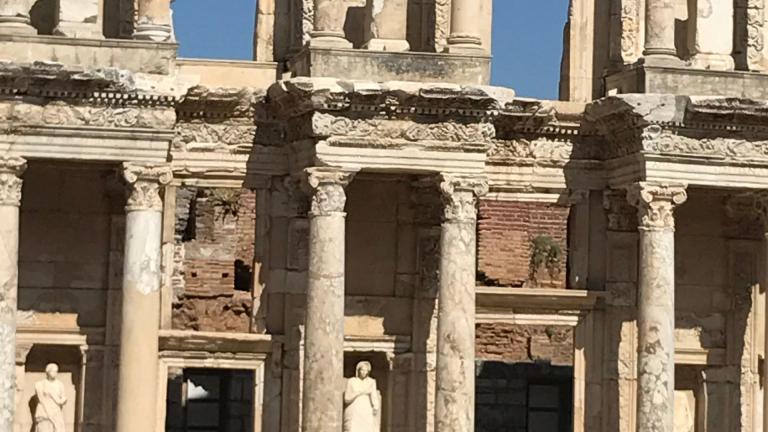
Monday: Read Acts 9:1-43; Galatians 1:13-17
Acts 9 begins with an account of Saul/Paul’s[2] transformation. While heading to Damascus with letters of extradition requesting that those Christians who fled Judea be brought back to Jerusalem for trial, the Lord appears to Saul/Paul. He is asked, “why are you persecuting Me?” (4). This must have been incredibly confusing for Saul/Paul. After all, Saul/Paul was convinced that he was doing the Lord’s work. (again, we must remember that Pharisees, such as Saul/Paul, believed that they were doing the Lord’s work. Our assumption that they are all bad, arrogant, and self-centered is not fair to the Pharisees as a whole).
Saul/Paul’s response is classic: “Who are you, Lord?” (5). If you look at this carefully you will notice that he answers his own question: “Who are you?” is the question. The answer is “the Lord.” Saul/Paul seemingly knows that it is the Lord but is confused because “the Lord” asks why Saul/Paul is persecuting Him. What Saul/Paul is not ready for is the response. “I am Jesus whom you are persecuting” (5). This must have come as quite a surprise.
We should not look at this episode as Saul/Paul’s “conversion.” It is better called his “transformation.” Saul/Paul’s blindness for the next three days reminds us of Jonah’s three days in the belly of the great fish and Jesus’ three days in the tomb.
Saul/Paul’s eyes are open when Ananias lays hands on him (17-18).
In Galatians 1:13-17, we learn that Paul spent 3 years in Arabia (south) and then 15 days in Jerusalem, followed by 10 years in Tarsus.
Acts 9 ends with an account of Peter’s ministry. Peter and Paul’s ministries in Acts are modeled on the ministry of Jesus. What Jesus does, they do. Jesus raised a girl from the dead (Mark 5), and so does Peter (40). This is in part what Jesus meant when He said, “the works that I do, he will do also; and greater works than these he will do” (John 14:12).
Questions to ponder/discuss:
- And we can only imagine how shocked Paul was when Jesus appeared to him. He truly believed he was doing the Lord’s will. Now he finds out that it was the Lord Himself whom he was persecuting. This should serve as a warning to us. No matter how much we might think we are doing the Lord’s will, is it possible that we have erred? I suspect that this question is not asked enough. And it is not asked enough with the humility needed to accept the answer. Search your life and ask the Lord to reveal any error you might have. (Note: Paul’s error cost people their lives—e.g., Stephen. And I suspect that Paul lived with that memory). And realize that it may take years for us to discern the answer to such a prayer.
- Saul/Paul’s transformation is complete when Ananias is called to lay hands on him (10-12). This serves as a wonderful illustration of the fact that God uses His people to do His work. We often wonder where God is in the middle of difficult times. Sometimes God answers, “well I called my people to act but they didn’t listen.” Other times God answers, “I am right here in the presence of my people who are loving you through this time.”
Tuesday: Read Acts 10:1-48
To understand well the story of Peter’s ministry at Cornelius’ house in Caesarea it is critical to remember that the OT forbids the eating of certain foods. Of course, Jesus had declared all foods clean (Mark 7:19). Nonetheless, the early Christians had not yet instituted this as a practice. After all, up to this time, their ministry was primarily among the Jews. They hadn’t gone out, as they were told, to the gentiles.
The conviction that certain foods are unclean meant that those who ate such foods were unclean. Some Jews understood this to mean that a gentile’s (i.e., a non-Jew) home was unclean because unclean food was in it.
We must also recognize that this is not simply a matter of “well now you can do it” and all the Jewish Christians will suddenly begin eating pepperoni pizza: “I’ve waited my whole life to eat this!”
Not only have they been convinced their whole life that it was wrong, but everyone in the culture, including their family, believes that it is wrong. If they start entering gentile’s homes and eating their foods, then they will be in serious conflict with their communities.
As a result, Peter has a dream in which he is told that it is okay to eat such foods. The vision prepares Peter for what it about to take place. Without it, Peter would not have entered Cornelius’ home and preached to them.
Peter’s sermon to the gentiles in Caesarea is a good synopsis of the Gospel (34-43). Luke tells us that “while he was still speaking” (44) the Holy Spirit came upon those listening—i.e., the gentiles! Peter’s companions (i.e., fellow Jews from Judea) were amazed “because the gift of the Holy Spirit had been poured out on the Gentiles also. For they were hearing them speaking with tongues and exalting God” (45-46).
Questions to ponder/discuss:
- It is easy for us to wonder how Peter could have resisted visiting gentiles when Jesus had told them that all foods were clean. But this does not account for the power of social and familial factors and their influence on our beliefs and our behaviors. This too should cause us to discern: “have there been occasions in which I have been afraid to do something I was called to do because I was worried what my community (which could include those in your church) would think?” (no one said taking up your cross was easy, or that it wouldn’t bring strife even in your own community)
Wednesday: Read Acts 11:1-30
Word of Peter’s action among the gentiles in Caesarea reached the Christ-followers in Jerusalem before Peter even returned. “Peter, you got some ‘splaining to do.” We cannot overestimate the gravity of this issue. Their eating with and welcoming of gentiles into the community is going to cause serious conflicts within their own families and relations and also within the larger Jewish community—whom they are trying to reach with the gospel.
When we carefully read Peter’s speech to those in Jerusalem (4-17), we can see the extent to which Peter is defending his actions.
The result of his speech was that “they quieted down and glorified God” (18). There is little doubt, however, that some later questioned Peter’s actions and that others who were not present to hear Peter for themselves continued to question Peter and the Christ-followers’ actions. This issue remained a major point of contention within the new Christian communities for decades to come.
Luke then informs us that some of those who were scattered because of Saul/Paul’s persecution following the stoning of Stephen (19) made their way to Antioch (Syria). The city of Antioch was the 3rd largest city in the Roman empire. As such, it served in the early years of the new movement as a central location for the more cosmopolitan Christian community.
Questions to ponder/discuss:
- The kingdom of God has come, and the presence of the Holy Spirit was the key sign of the arrival of the kingdom! (cf Ezek 36:24-27: this will be a major point that Paul makes in his writings—esp Galatians). This, however, caused serious problems within the Jewish community. If it was not enough that the Christ-followers were not sacrificing at the temple, now they were eating with pagans. In light of this, we can see how easy it would have been for some to compromise. The effect of compromising would have been to make gentiles second-class citizens within the Christian community. This raises the question as to how and when we might compromise our convictions in order that we might pacify others and minimize our own suffering? The effect of such compromise is that others are hurt. I know now that my views on women and the Middle East have brought great harm to many. I also know that my ignorance on the issues of race helped to perpetuate conflict and the oppression of people of color. What about you?
Thursday: Read Acts 12:1-25
We are not told why, but Herod Agrippa I, a grandson of Herod the Great, began mistreating the Christ-followers. Because this gained favor among the rest of the Jews (reminding us of the tensions that were present between the new Christ-followers and the rest of the Jewish world), Herod decided to step up his activities (client kings like Herod were always in need of good relations with their subjects—it simply made it easier for them to govern). As a result, Herod has James, one of the twelve, killed (2).
Herod then has Peter arrested with the full intent of killing him within a few days (3-4). The night before his impending death, Peter is released by an angel of the Lord (6-11). Luke highlights the improbability of the event (6).
Peter narrowly escapes and shows up at the home of the Mary, the mother of John Mark, where the Christians were praying (12). Luke notes that after Peter met with them briefly, “he left and went to another place” (17)—which suggests that either Luke doesn’t know where he went, or that it was still not safe to identify where he went. With the former being more likely, it is surprising that Luke, who carefully researched everything (Luke 1:1-4) did not know where Peter went.
Questions to ponder/discuss:
- The power of prayer. Prayer did not save James’ life. But it did Peter’s. The narrative of Peter’s escape and arrival at Mary’s house suggests that those praying were surprised to find Peter at the front door. How much do we underemphasize the power of prayer? Are we surprised when God answers our prayers? What do we do when God doesn’t answer our prayers?
Friday: Read Acts 13:1-52
Luke now begins to chronicle Paul’s missionary journeys. Leaving Antioch—the new home of the movement—Paul and Barnabas travel to Barnabas’ hometown on the island of Cyprus (4:36). There they confront a sorcerer.
Leaving Cyprus, they head to Asia Minor (modern-day Turkey). There John Mark “left them and returned to Jerusalem” (13). The circumstances of Mark’s “deserting them” (15:38) are not given by Luke. That Mark’s leaving was significant is evidenced by the fact that Luke mentions it. In typical Lukan style, however, Luke does not offer an opinion as to why Mark left.
Paul and Barnabas continue inland to the cities of Pisidian Antioch, Lystra, Iconium, and Derbe. These are likely (the latter three cities at least) the Galatian churches to whom Paul will soon write his first letter. Also, of note, is that Lystra is the home of Timothy. It may be the case that Timothy begins to follow Jesus at this time. On Paul’s next journey, Timothy will join him on his travels.
One of the protocols that Paul and Barnabas put in place on their journeys is that in every city they were to visit the synagogues first. After that, they would reach out to the rest of the city.
Interestingly, Paul and Barnabas justify their ministry to the nations (the gentiles) by citing Isa 49:6 (47) by claiming, “the Lord commanded us.” In other words, the prophecy of Isaiah was about Paul and Barnabas. This prophecy, however, was cited by Simeon in Luke 2:32 and applied to Jesus. What was true of Jesus is also true of Paul and Barnabas. This again confirms that the mission of God’s people, then and now, continues the mission of Jesus.
Questions to ponder/discuss:
- The practice of going to the Jews and the synagogues first in every city was a matter of conviction—the Gospel goes to the Jews first (Rom 1:16). It was also a matter of prudence. If they went to the Greeks or Romans first, then the Jews in the city would not have listened to them. If, however, they preach to the Jews first, they may then preach to the gentiles.
NB: our goal is to keep these posts free of charge. I do not intend to ever hide them behind a paywall. I can only do this if those of you who have been blessed by them and can afford to give ($5, $10, $25, or more/month) do so. You can give a tax-deductible contribution by following this link.
Please share this post and let others know about determinetruth.
If you wish to view this blog on your smartphone through the Determinetruth app simply download the “tithe.ly church” app on your smartphone and insert “determinetruth” as the church name you wish to follow. Once it is loaded, simply click on the “blog” icon and it will automatically load.
If you would like to have Rob speak at your church or organization in person or via zoom, please let us know by filling out the contact info on the Contact me tab on this site.
[1] This guide is meant to be done either as a group study over the course of 2 or 4 meetings (Day 1-5; 6-10; 11-15; 16-20), or as a private devotion over the course of 4 weeks (or a calendar month—5 lessons per week).
[2] I will use Saul/Paul for the next few chapters. Saul was effectively what we would call his “first” name. Paul was his Roman name. As a Roman citizen, he would have had a “last” name but we do not know what it was.













